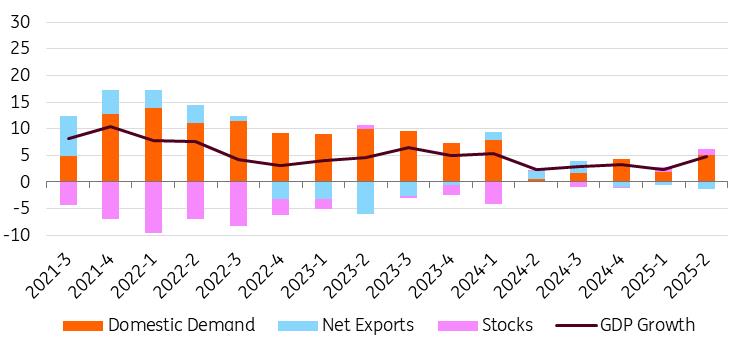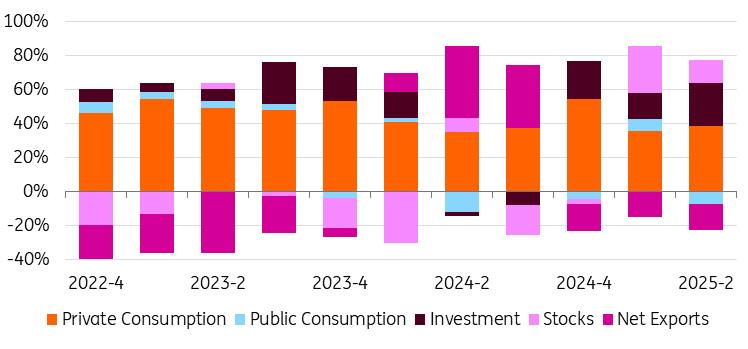Turkish Growth Beats Expectations Amid Resilient Domestic Demand
In the second quarter of 2025, Turkey's GDP grew by 4.8% year-on-year, surpassing both the market consensus of 4.1% and our forecast of 3.8%. This marks a notable acceleration compared to previous quarters, partially supported by a favourable base effect. The growth was primarily driven by robust private consumption and increased investment activity. As a result, GDP growth for the first half of the year reached 3.3%.
With the release of the latest data, TurkStat revised the GDP series as part of its harmonisation efforts with the European System of National Accounts, extending the historical data series back to 1995. Following these revisions, first-quarter GDP was adjusted upward from 2.0% to 2.3%, while full-year 2024 growth was revised from 3.2% to 3.3%.
After seasonal adjustments, GDP for the second quarter of this year corresponds to a quarter-on-quarter growth rate of 1.6% – the highest quarterly increase in the past two years. This unexpected momentum, despite tighter financial conditions following political developments in March, is attributed to a) a positive shift in investment contributions, and b) inventory accumulation, which exceeds drags from private consumption, government spending, and net exports.
GDP growth (%, YoY)
Source: TurkStat, ING
When we look at the breakdown of expenditures:
-
Private consumption rose by 5.1% YoY, contributing 3.4 percentage points to headline GDP. This reflects an acceleration from the previous quarter, aided by base effects.
Investments grew by 8.8% YoY, adding 2.2ppt to GDP. This was largely driven by a continued surge in construction investments, which reached 11.6% YoY and a modest recovery in machinery and equipment investments, which turned positive with a 0.3% YoY increase.
Public consumption contracted by 5.2% YoY, subtracting 0.6ppt from GDP. This decline signals intensified efforts to rein in fiscal spending.
Inventory build-up contributed 1.2ppt to growth.
Net exports dragged GDP down by 1.4ppt, continuing the negative trend from the previous two quarters due to rising imports.
In the sectoral breakdown, the services sector was the largest contributor, adding 1.5ppt to GDP. The industrial sector followed with a 1.2ppt contribution, showing signs of recovery after three consecutive quarters of negative impact on headline growth.
Drivers of growth (ppt contribution)
Source: TurkStat, ING
Overall, the second-quarter data reveals a clear acceleration in both annual and quarterly growth, defying earlier expectations of a slowdown in quarterly momentum. This suggests upside risks to Turkey's 2025 growth outlook, especially amid ongoing monetary easing.
However, this stronger-than-expected performance may prompt the central bank to adopt a more cautious approach to interest rate cuts. Given the resilience in domestic demand, we have raised our full-year GDP growth forecast for 2025 to 3.3%, up from the previous estimate of 2.7%.

Legal Disclaimer:
MENAFN provides the
information “as is” without warranty of any kind. We do not accept
any responsibility or liability for the accuracy, content, images,
videos, licenses, completeness, legality, or reliability of the information
contained in this article. If you have any complaints or copyright
issues related to this article, kindly contact the provider above.
Most popular stories
Market Research

- United States Lubricants Market Growth Opportunities & Share Dynamics 20252033
- UK Digital Health Market To Reach USD 37.6 Billion By 2033
- Immigration Consultancy Business Plan 2025: What You Need To Get Started
- United States Animal Health Market Size, Industry Trends, Share, Growth And Report 2025-2033
- Latin America Mobile Payment Market To Hit USD 1,688.0 Billion By 2033
- United States Jewelry Market Forecast On Growth & Demand Drivers 20252033





















Comments
No comment